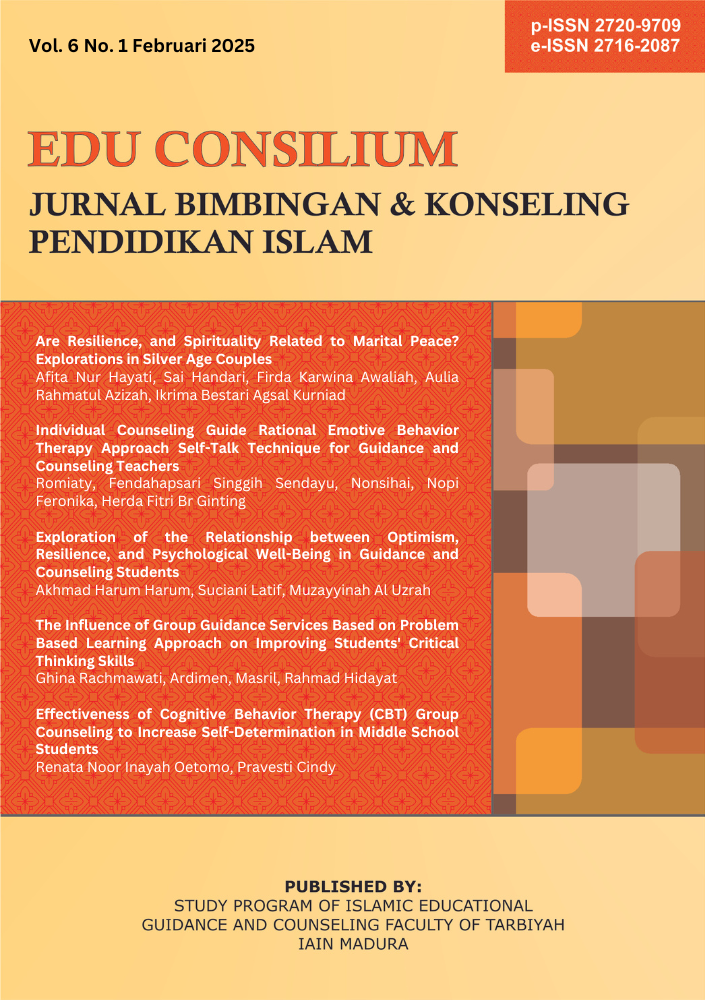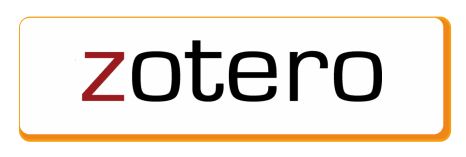Effectiveness of Cognitive Behavior Therapy (CBT) Group Counseling to Increase Self-Determination in Middle School Students
 Abstract views: 97
,
Abstract views: 97
,
 PDF downloads: 67
PDF downloads: 67
Abstract
Self-determination is an important factor in living life. The cause of low self-determination is the dominance of negative thoughts. Self-determination can be increased through various efforts or endeavors, one of which is fighting negative thoughts through cognitive behavior therapy counseling. The aim or purpose of this research is to increase self-determination through cognitive behavior therapy group counseling activities. Quantitative research takes the form of a pre-experimental one group pre-test post-test design which takes samples using a simple random sampling technique so that it becomes a reference in this research method. The application of the instrument or implementation of the instrument in this research is by using a self-determination scale which has been tested for validity and reliability. From the research that has been carried out, it is stated that the results of the implementation of cognitive behavior therapy group counseling are effective in increasing the self-determination of class VIII students at SMP PGRI 1 Buduran Sidoarjo, with the results of statistical tests calculated by the Wilcoxon test having a significance value (2-tailed), namely 0.042 < 0.05.
Downloads
References
Agow, M. R., & Sundah, A. (2023). Efektifitas Konseling Kelompok Teknik Cognitive Restructuring Terhadap Peningkatan Kepercayaan Diri Siswa SMP Negeri 8 Touluaan. Jurnal Ilmiah Wahana Pendidikan, 9(24), 986–995.
Ayun, Q., & Wibowo, N. R. (2020). Teknik Cognitive Behavioral Therapy untuk Meningkatkan Motivasi Berprestasi Mahasiswa. Analitika, 12(2), 159–168. https://doi.org/10.31289/analitika.v12i2.3701
Brown, K. W., & Ryan, R. M. (2004). Perils and promise in defining and measuring mindfulness: Observations from experience. Clinical Psychology: Science and Practice, 11(3), 242–248. https://doi.org/10.1093/clipsy/bph078
Dananier, N. (2019). Efektivitas Bimbingan dan Konseling Cognitive Behaviour Therapy untuk Meningkatkan Determinasi Diri. Kurikula, 1(1). https://doi.org/10.5281/kurikulajurnalpendidikan.v1i1.370
Deci, E. L., & Ryan, R. M. (1985). Instrinsic Motivation and Self-Determination in Human Behavior. https://doi.org/10.1007/978-1-4899-2271-7
Deci, E. L., & Ryan, R. M. (2000). The “What” and “Why” of Goal Pursuits: Human Needs and the Self-Determination of Behavior. Psychological Inquiry, 11(4), 227–268. https://doi.org/10.1207/S15327965PLI1104
Deci, E. L., & Ryan, R. M. (2017). Self-determination theory. Basic psychological needs in motivation, development and wellness. Guilford Press: New York, 38, 231. https://doi.org/10.7202/1041847ar
Fakhriyani, D. V., Saâ, I., & Annajih, M. Z. (2021). Pendekatan REBT Melalui Cyber Counseling untuk Mengatasi Kecemasan di Masa Pandemi COVID-19. Counsellia: Jurnal Bimbingan dan Konseling, 11(1), 56-70. https://doi.org/10.25273/counsellia.v11i1.8463
Fitri, Suranata, K., & Dharsana, I. K. (2020). Effectiveness of Cognitive Behavior Counseling with Cognitive Restrukturing Techniques to Improve Self Intraception. Jurnal Bimbingan Konseling Indonesia, 1(2), 7. https://doi.org/10.24036/XXXXXXXXXX-X
Habsy, B. A., & Suryoningsih, M. (2022). Konseling Kelompok Teknik Restrukturisasi Kognitif Untuk Meningkatkan Self-Efficacy Karir Siswa SMK, Efektifkah? Jurnal Bikotetik (Bimbingan Dan Konseling: Teori Dan Praktik), 6(2), 46–51. https://doi.org/10.26740/bikotetik.v6n2.p46-51
Islamiah, N., Daengsari, D. P., & Hartianti, F. (2015). Cognitive Behavior Therapy untuk Meningkatkan Self-Esteem pada Anak Usia Sekolah. Jurnal Ilmu Keluarga Dan Konsumen, 8(3), 142–152. https://doi.org/10.24156/jikk.2015.8.3.142
Lia, J., Wini, H., Nina, M., Nurrandi, S. R., & Desi, A. T. (2021). Pengaruh Cognitive Behavior Therapy (CBT) pada Peningkatan Harga Diri Remaja: Literature Review. 7, 32–38.
Mamahit, H. C. (2014). Hubungan Antara Determinasi Diri Dan Kemampuan Pengambilan Keputusan Karir Siswa Sma. Jurnal Psiko-Edukasi, 12(2), 90–100. http://ojs.atmajaya.ac.id/index.php/fkip/article/view/297
Muwakhidah, M., & Pravesti, C. A. (2017). Keefektifan Konseling Kelompok Cognitive Behavior Therapy untuk Mengurangi Keraguan Pengambilan Keputusan Karier Siswa Sekolah Menengah Kejuruan. Jurnal Kajian Bimbingan Dan Konseling, 2(2), 66–75. https://doi.org/10.17977/um001v2i22017p066
Rahmawati, W. K. (2016). Efektivitas Teknik Restrukturisasi Kognitif untuk Menangani Stres Akademik Siswa. 3(1), 22–30.
Sa'idah, I. (2019). Teori Dan Teknik Konseling. Pamekasan: IAIN Madura Press
Utami, N., Kustati, M., & Zeky, A. A. (2020). Hubungan Antara Determinasi Diri dengan Hasil Belajar Peserta Didik Kelas XI MAN 3 Kota Padang. Jurnal Al-Taujih, 6(1), 80–87. https://ejournal.uinib.ac.id/jurnal/index.php/attaujih/article/view/1756
Widuri, indri P. (2020). Keefektivan Teknik Restrukturisasi Kognitif Untuk Meningkatkan Motivasi Belajar Dalam Konseling Individu. II(April), 101–105.
Wiraning, B. (2021). Determinasi Diri Mahasiswa di Masa Pandemi Covid-19. Universitas Islam Negeri Maulana Malik Ibrahim Malang.
The journal operates an Open Access policy under a Creative Commons Non-Commercial 4.0 International license. Authors who publish with this journal agree to the following terms:
- Authors retain copyright and grant the journal right of first publication with the work simultaneously licensed under a
 Commons Attribution-NonCommercial 4.0 International License
Commons Attribution-NonCommercial 4.0 International Licensethat allows others to share — copy and redistribute the material in any medium or format, and adapt — remix, transform, and build upon the material.
- Authors are able to enter into separate, additional contractual arrangements for the non-exclusive distribution of the journal's published version of the work (e.g., post it to an institutional repository or publish it in a book), with an acknowledgement of its initial publication in this journal.
- Authors are permitted and encouraged to post their work online (e.g., in institutional repositories or on their website) prior to and during the submission process, as it can lead to productive exchanges, as well as earlier and greater citation of published work (see The Effect of Open Access).




















